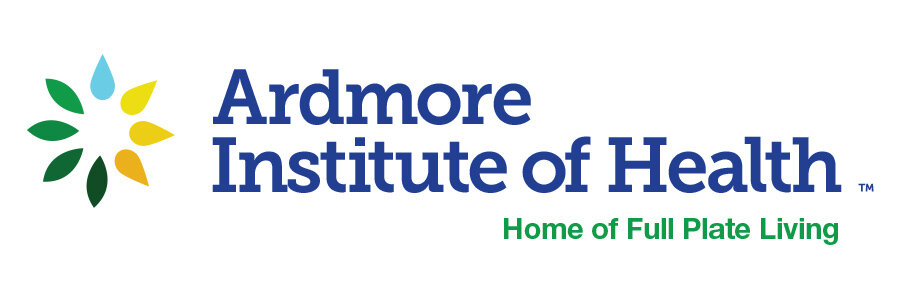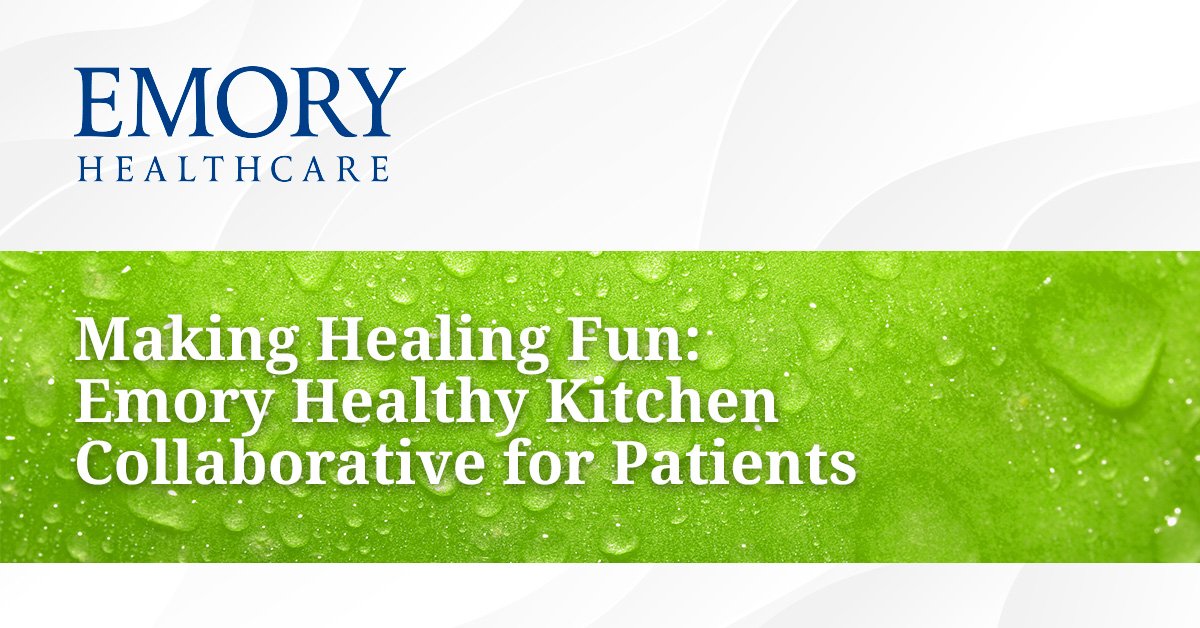Making Healing Fun: Emory Healthy Kitchen Collaborative for Patients
The following post, by Krystyna Rastorguieva, MPH, is provided by AIH grantee Emory Healthy Kitchen Collaborative. Read on for an update on their learnings.
A group of patients, now bonded together by a shared journey, recently gathered for a reunion where they made heart-healthy plant-based Valentines-day-inspired dishes. They were patients at the Emory Decatur Wellness Center and the Emory Decatur Hospital Comprehensive Weight Loss Center, and the journey they shared was the Emory Healthy Kitchen Collaborative program (EHKC). The last time they met, they were competing in a friendly cook-off, working in groups and creating a delicious healthy dish from a “mystery box” of local produce using culinary skills they had learned together in the previous nine weeks. And all of this was a part of their healthcare visit.
Shots from the Class 10 Mystery Box Cook Off Competition, full group at the end of class, and judges table sampling and evaluating dishes presented by each group.
Fun is evidently one of the key ingredients of EHKC program, applicable to both patients and staff:
“Healthy Kitchen is a breath of fresh air. It is just pure fun and joy to get out of the clinic routine and interact with our patients in a different environment. The format itself facilitates more meaningful interactions between me and my patients and among patients. They are learning a lot of good information in a safe, non-judgmental space. And more importantly, they are developing new skills through experiences together and I get to learn from them along the way too!” says Brittany Jones, registered dietitian and EHKC group facilitator at the Emory Decatur Wellness Center.
Background
Left to right: Brittany Jones, RD, with Tammy and Al, program participants, making soup from scratch.
Emory Healthy Kitchen Collaborative (EHKC) is a multidisciplinary program based on pillars of lifestyle medicine, where participants learn through hands-on experiences. The program originated in 2019 as a work-site wellness program, and was implemented for two groups of Emory employees – once in person and once virtually. After proving to be effective for behavior change in a employee setting, the natural progression was to expand the program to a patient setting.
“I am really excited that we were able to partner with Emory Decatur Wellness to bring this program to patients! We have demonstrated how effective this program can be in the worksite setting with employees and I am optimistic that we can achieve equally awesome results with patients too,“ shared Jonathan Bonnet, MD, EHKC Program advisor.
Photo at the American College of Lifestyle Medicine Conference in November, 2022 in front of the poster on the Barriers and Facilitators for Implementing EHKC presented by the EHKC research group. From left to right: Jonathan Bonnet, Krystyna Rastorguieva, David Eisenberg, Sharon Bergquist
EHKC for Patients
The teams at the Emory Decatur Wellness Center and the Comprehensive Weigh Loss Center have been thrilled about the partnership from the start and went all in to make this a success.
“This program offered a fresh new outlook for many of our patients,” said Katherine Kemp, the Clinic Operations Manager at the Emory Decatur Comprehensive Weight Loss Center. “It was such a pleasure to see patients form friendships and bonds while interacting in the Healthy Kitchen class. The excitement each week of learning new ideas and tools to assist everyone in achieving a healthier life was beyond measure. The benefits of a program like this will take our program to a new level.”
In addition to cooking classes, participants engaged in group exercise classes, yoga, tai chi, and even planted herbs and sprouts with the help of the local farmer, Chris Lemons, supporting the Gratitude Botanical Garden.
Photos from the gardening class with Chris Lemons.
And patients enjoyed the program very much. Culinary demonstrations, of course, were the most favored activities.
“I truly enjoyed the [cooking] demo classes at the wellness center”, says Mike Bacha, Executive Chef at Emory University Hospital who served as the lead chef through all EHKC programs to date, “the participants were so engaged, came with great attitudes each week, and genuinely showed so much appreciation for the skills they learned. I always enjoy teaching these classes, but given the opportunity to engage with patients made this extra special!”
Education
Tiffany Egbo and Chef Mike Bacha
Participants were not the only learners in the EHKC program. The education mission and creating learning opportunities for the new generations of healthcare professionals continues to be an integral component of EHKC program implementation. From the very first cohort, EHKC has held space for students and interns to learn and practice program coordination and delivery, motivational interviewing, data analytics, and group facilitation. This year Chef Mike Bacha has also engaged dietetic students, Tiffany Egbo and Megan Huff, in facilitating teaching kitchen classes.
“This program sparked a new love for educating patients on the importance of eating whole foods and taking care of their bodies. I was able to work with patients in the teaching kitchen and was excited by their interest and desire to learn. It was not only inspiring but also emphasized the importance of educating patients on how to navigate the kitchen. It is so easy to assume everyone knows what to buy at the grocery store and how to prepare a healthy meal, but this is not the case. EHK provided a space for patients to be vulnerable about their struggles and goals while improving their knowledge to create lifelong habits. This community continues to remind me of why I am pursuing the field of dietetics and encourages me to continue learning and teaching.” said Tiffany Egbo, Dietetic Intern. After being a part of the EHKC class Tiffany became curious in lifestyle medicine as a specialty, completed introductory training on the subject and presented her learnings in a final presentation to her cohort and instructors.
Partnerships
From the very origination of EHKC back in 2019, Ardmore Institute of Health (AIH) served as a huge supporter and advocate of the program, both in way of financial support through grant funding, as well as sharing resources (such as Full Plate Living program), and a supportive network. They continue to stay close and visit regularly to learn alongside every new cohort. Janet Calhoun, the SVP and COO of AIH, paid a visit again in January this year, touring the new site at the Emory Decatur Wellness Center.
“It is a pleasure to have the opportunity to support the important work happening through the amazing integrated team of health professionals at Emory,” says Janet after her visit to Emory. “This Emory team is leading projects and research that elevate the evidence base of how to incorporate healthy lifestyle elements into clinical practice to improve patient outcomes and care.”
Left to right: Mike Bacha (Executive Chef at Emory University Hospital), Amanda Thomas (Director of Emory Decatur Wellness Center), Katherine Kemp (Manager at the Emory Decatur Comprehensive Weight loss Center), Janet Calhoun (COO of Ardmore Institute of Health), Krystyna Rastorguieva (Director at Emory WHSC Office of Well-Being), Brittany Jones (Registered Dietitian at Emory Decatur Wellness Center).
Research
Miranda Moore (left), David Eisenberg (center, the Founder of Teaching Kitchen Collaborative) and Krystyna Rastorguieva (right) at the TKRC 2022.
EHKC has always been laser-focused on research and program evaluation, to maximize the opportunity to learn from the process and share the learnings with other healthcare institutions. The support of AIH has fueled the research capacity of the program, and the results of that work are already making impact. EHKC first presented at the Teaching Kitchen Research Conference in 2020, winning the Top Teaching Kitchen Research Abstract award. In 2022 the EHKC research group presented at two international academic conferences, including Teaching Kitchen Research Conference and the American College of Lifestyle Medicine Annual Conference. The EHKC has published 4 manuscripts presenting the results of the 2019 program, with over 3 more in the works.
Based on the interest and feedback from other academic institutions so far, EHKC program results are inspiring others to engage in their own teaching kitchen programs.
Left: Megan Grega (left, Founder and CMO of Kellyn Foundation), Sharon Bergquist (middle) and Krystyna Rastorguieva (right) at the ACLM 2022 Conference. Right:Full room for the presentation.
“The EHKC is serving as a role model in publication success. We are heartened to know others are learning from our results and can provide strong evidence to seek funding to implement their own teaching kitchen program,” says Miranda Moore, PhD, EKHC Lead Evaluator.
In her new recently elected and highly sought-after role as the Teaching Kitchen Collaborative Research Committee Co-Chair, Miranda Moore is working to increase recognition for research success in the teaching kitchen space by implementing a Teaching Kitchen Research Paper of the Year award.
What’s Next
EHKC team is working on analyzing much of the data collected through all 3 cohorts and learning from those findings. They are also continuing to streamline the program, maximizing its effectiveness while minimizing cost.
Sharon Bergquist, MD, the Founder and Medical Director of the EHKC program talked about what's next.
“Inspired by the success of the program, our vision is to make the curriculum available to other groups interested in starting a teaching kitchen. Our aim from the start was to make our intensive lifestyle change program accessible to as many people as possible. We are excited to make accessibility a reality!”
Related Grant: Emory Healthy Kitchen Collaborative Virtual Program









